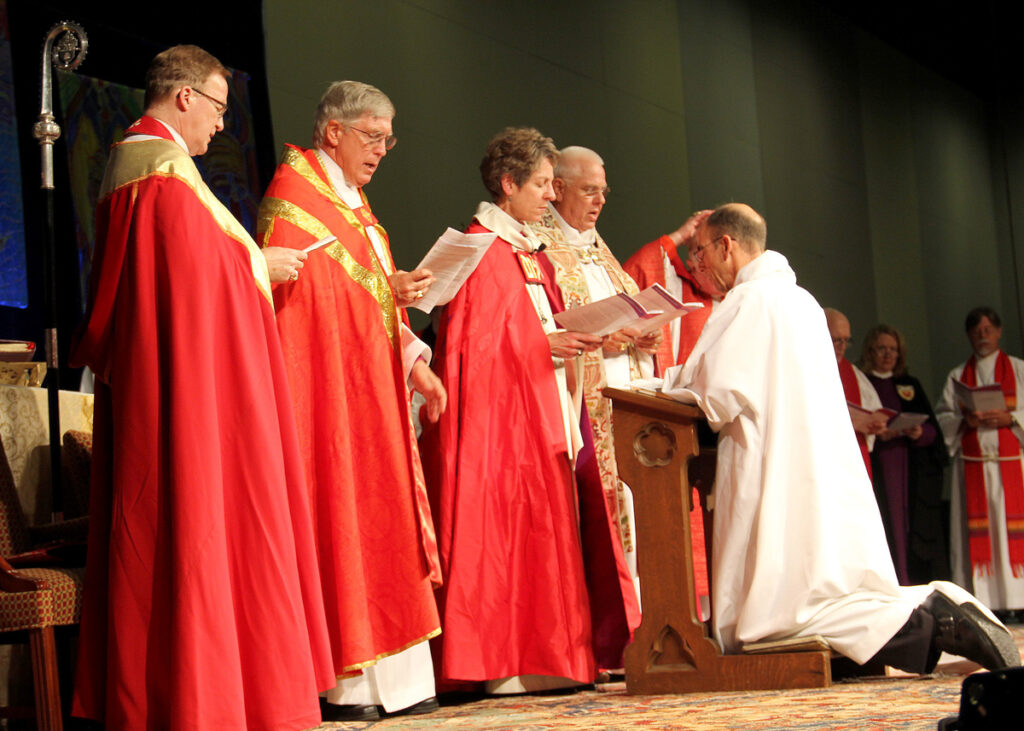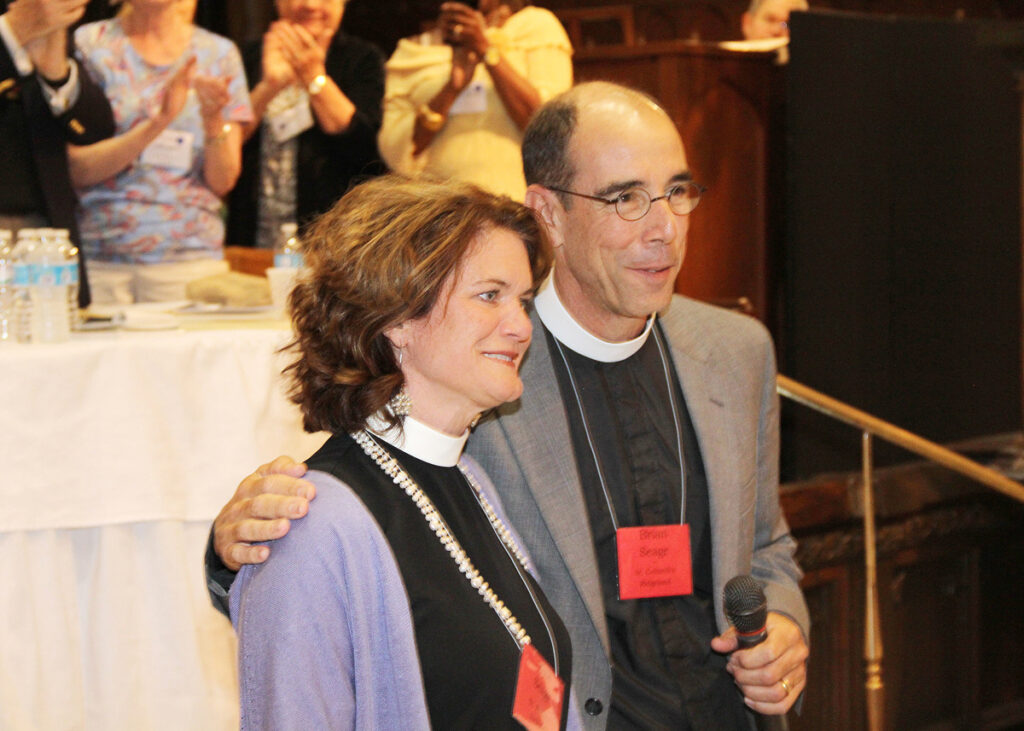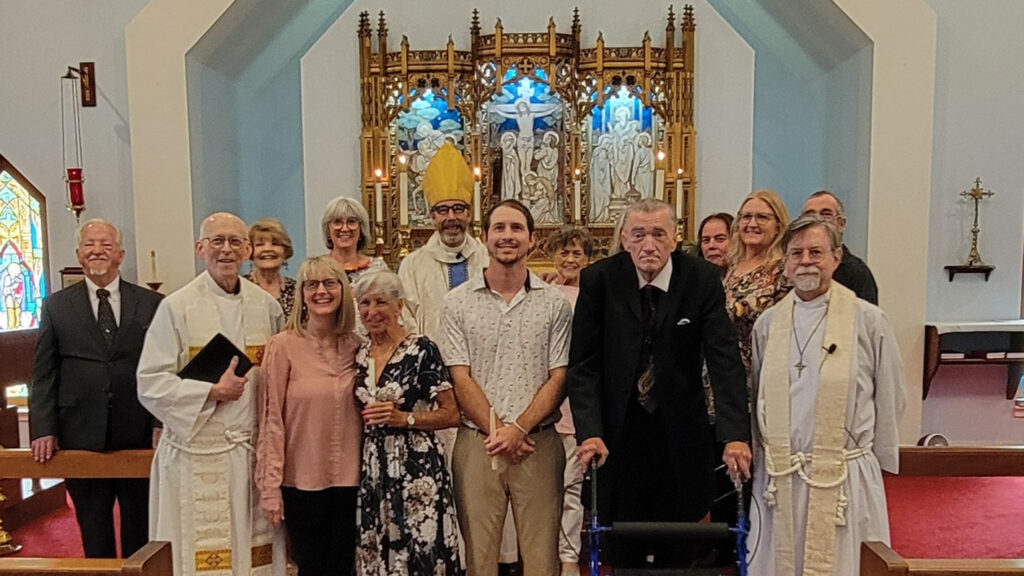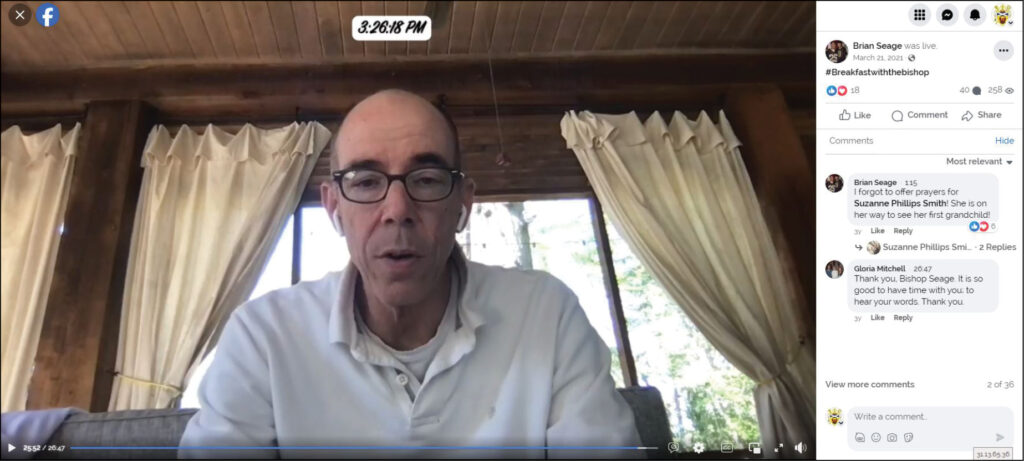One day in the fall of 2014, a newly-minted Bishop Brian Seage found himself at Mediator, Meridian, waiting for the morning’s service to begin. It was a large procession—full of choir members, acolytes, lay readers, and other clergy—too large for the vestibule to accommodate. As such, those last in line to process, including the bishop, had to wait on the walkway outside.
Seage, who, at only about 5 months in the job, was still getting used to wearing his mitre and carrying his crozier, saw a young boy and his father come around the corner of the church, presumably fresh from Sunday School.
“The little boy stopped, and he whispered something to his father,” Seage recalls. “And as he walked into the church, I could see him looking back at me. And later on his father told me what he whispered, which was ‘Daddy, Daddy, I think that’s the king.’”
It was the first half of a great juxtaposition Seage would come to know well during his decade as the tenth Bishop of Mississippi.
“I’ve worshipped in some of the smaller churches where there were maybe a dozen of us or even less, and really felt like I was in the presence of just an intimate, lovely family gathering,” he says. “Like something that I would expect when visiting my parents, sitting around a table and enjoying a meal together and chit chatting. So I’ve got those sort of bookend images of being treated like the king, but on the other hand being a son coming home to visit mom and dad.”

Seage’s years as bishop have been a bit of a study in contrasts from day one, when he was elected on May 3, 2014, as a California boy transplanted to Mississippi. Though he felt called and ready to serve, he wasn’t convinced the diocese would feel the same way. He remembers awaiting the results with his wife, the Rev. Kyle Seage.
“Kyle and I have joked about it, but it’s true, we really didn’t think I would be elected,” Seage says. “I had worked here for a while, so everybody knew me. But we thought there were people who may have fit the profile better than I did, or better than I believed I did.”
Once the reality of the election set in, Seage began contemplating the challenges and opportunities that lay ahead.
“I really began to reflect that I was going to be invited into all the various Episcopal communities throughout Mississippi. And what a great honor that is and now, how can I enhance their faith? How can I help support their faith journey? How can I add to it?”
It was the start of a decade that would find Seage forging relationships in every parish and mission in the diocese, from Southaven to Pascagoula, Natchez to Corinth, and everywhere in between. He’s visited most of them at least 5 times, some 10 or more. It’s an interesting education for Seage to look back on as he prepares to return to California. There he’ll join Kyle—now, by coincidence, an Alabama girl transplanted to California—where she has taken the job of rector at St. Stephen’s Episcopal Church in Belvedere.

Though Mississippi was nowhere on his horizon when he was a young man, it’s become a central part of who he is as a clergyperson and as a human being.
“It’s been an incredible blessing to be an adopted Mississippian,” says Seage. “For these 27 years, it’s been really special to have been allowed to be in people’s homes, to be invited in some of the most intimate moments in their lives—baptisms, confirmations, weddings, funerals. And that is part of the joy of the priesthood, the joy of the episcopate, and the joy of doing ministry. I think Mississippi has done more for me than I could have ever done for Mississippi.”
As the clock runs out on this chapter of his life, he’s excited for the future, even as he reflects on all that’s transpired during his time in Mississippi. Particularly bright points include work on the Beloved Community racial reconciliation program and in addiction recovery communities. Perhaps the defining accomplishment of Seage’s career, however, was one he never could have planned for when he started.

Seage makes the last visit of his episcopate to Saint Pierre’s in Gautier on April 28. He baptized and confirmed two adults, Logan Gorum and DeeDee Cogan. Scott Avery was received in the Episcopal Church and nine parishioners reaffirmed their baptismal vows. A brunch was held after the service in honor of the bishop and those receiving the laying on of hands.“The work we did during the pandemic, that was probably the most difficult period and ministry that I’ve ever experienced,” he says. “The whole idea of telling people not to come to church is just anathema to my experience—it wasn’t something we studied in seminary. But watching us work together to get through that, leading as we did our best to learn how to do live stream, learn how to make contact resume. All that was just fascinating.”
It was a learning experience for all, bishop included.
“If anybody would have told me 10 years ago that I would be doing a Sunday morning talk show called Breakfast with the Bishop, I would have said, ‘what dream is that coming from,’ but yet there I was during the pandemic, hosting a Facebook live talk show.”
There were other dark moments during that period that amplified the chaos of the time, such as the civil unrest following the murder of George Floyd. Seage remembers how he and Mississippi religious leaders from other Christian denominations as well as other faiths banded together to make a statement that, among other things, contributed to the long-overdue retiring of the state’s confederate-emblem-bearing flag.
As he looks ahead to July, when his successor, the Rev. Dr. Dorothy Sanders Wells, will relieve him of his duties and he’ll return to California, the thing he’s most excited about is reuniting with Kyle. They will have been living apart, with occasional visits, for 18 months by that time.
“I’m looking forward to being under the same roof as my wife again,” says Seage. “I’m ready for that normalcy again, you know, being able to share the day’s journey. The holiness of a meal, sitting down for supper at the end of the day. Yeah, I’ve missed that.”
Seage will depart with confidence—he sees a wonderful future for the diocese he loves with Wells at the helm.
“She’s going to be a real blessing to Mississippi,” he says. “And I think Mississippi is going to be a real blessing to her. I think we’re really ready for someone with the unique skills that she brings to this, and she’s going to bring some amazing gifts for ministry that I think are really going to help us spread the gospel in some amazing ways.”
And as he prepares to say goodbye to so many beloved friends, Seage has a message for the state and the diocese that has given him so much.
“If I can say anything to the people of Mississippi, it would be that you are blessed, and you are holy,” he says. “And you have such an important message to share with the world. That message is one of holy hospitality. You all represent Jesus, in so many important ways, to the world at large. Mississippi has a history. So does the rest of the world. Mississippi has so much to share that the rest of the world could benefit from, so continue to preach the gospel at all times. And use words if you must.”
